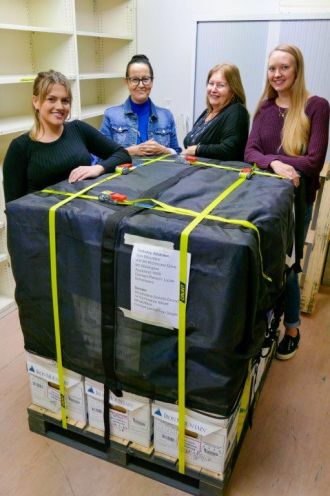 Whakatāne District Council’s climate change project continues to make progress against the strategy and action plans, which were adopted last year and build on the climate change principles adopted in 2019.
Whakatāne District Council’s climate change project continues to make progress against the strategy and action plans, which were adopted last year and build on the climate change principles adopted in 2019.
Two case studies that highlight the success of different climate change-related projects were presented at the Strategy and Policy Committee meeting last week. The first case study explains how a unique method to wrap pallets has negated the need for layers of plastic. The second focuses on water pump replacements in Murupara and Otakiri, with the new, higher-efficiency pumps significantly reducing electricity use.
Climate Change Coordinator, Katri Harmoinen, says the case studies align with one of the goals specified in the Council’s Leadership and Collaboration Action Plan.
“This goal is about letting our communities know what we’re doing in the climate change space, including celebrating the successes and sharing our learnings, so we can help others reduce carbon footprints,” she explains. “These case studies are definitely a reason to celebrate; initial results from the new higher-efficiency water pumps show we’re on track to reduce Council’s carbon emissions by 16,500 kgCO2e (metric measure of emissions) annually and electricity use by 157,000 kwH, saving about $22,000 a year.”
Ms Harmoinen also says that the new ‘eco pallet’ methodology has saved more than 2,360 metres of plastic going to landfill, after staff identified the issue and sought to find a new environmentally-friendly solution.
“Our Quality Assurance team, which manages the property file digitisation project, quickly realised that using multiple layers of plastic for each of the 52 pallets they needed to send away did not support the Council’s climate change principles,” Ms Harmoinen reports. “They switched to ‘eco-pallet’ materials that included reusable tarpaulins and tie-downs, and saved the equivalent of 21 times the length of Eden Park Stadium in plastic wrap.”
She also says that beyond these examples, opportunities to further identify and develop new case studies are in progress.
As well as these savings, the Council’s energy management programme with specialists Emsol continues. Current reports show approximately 300,000 kgCO2e has been saved across Council operations since the programme began in January 2019.
“There have been several initiatives put in place across Council facilities to reduce our energy emissions, including switching from gas boilers to heat pumps at the Whakatāne Aquatic and Fitness Centre,”
Ms Harmoinen says. “Overall, our savings to date is equivalent to the average annual carbon footprint of 40 New Zealanders or ten households. Figures like this prove small changes can make a big difference.”
Another point discussed at the meeting was the development of a climate change risk assessment and adaptation project. This significant project aims to deliver two short/medium-term targets, including producing a matrix to identify communities most at risk from climate-related natural hazards.
Ms Harmoinen says this particular project will exist alongside other strategic projects for Council, including spatial planning, future development strategy and hazard-planning.
“We’re aware that this is a critical project for our communities, and will work in collaboration with key stakeholders to make sure affected communities have a robust, individalised plan in the future,” she describes. “The strategic project workstreams will inform our Long Term Plan 2024-34, so the next three years are about ensuring we have everything in place to make educated decisions.”
Going forward, all Council reports will also include a climate change assessment. By regularly considering climate change in every report received by Council, alternative options can be considered, which ultimately, could influence decision-making outcomes. Elected members and staff have resources available in the form of an ‘e-learning hub’ to help guide their knowledge and awareness of climate change-related information.
“We’ve created a ‘one stop online shop’ for accurate and engaging climate change information, presented in four modules,” Ms Harmoinen explains. “The e-learning hub is also publicly available on the Council’s website, so I encourage anyone who is interested in finding out more about climate change to take a look. While the Council does not own, and is not the author of, most of the content, we believe it’s an easily-digested way to increase your understanding about climate change.”
Find out more about the Council's climate change project, including the e-learning hub portal.